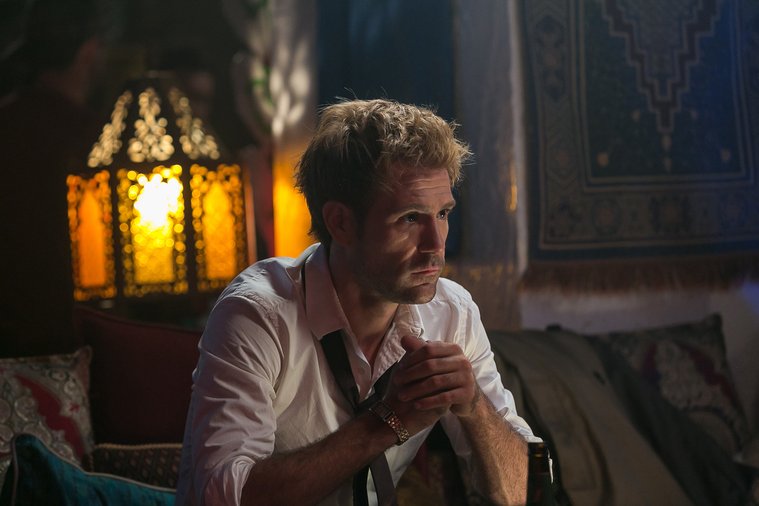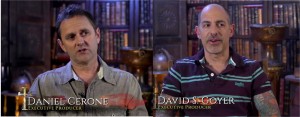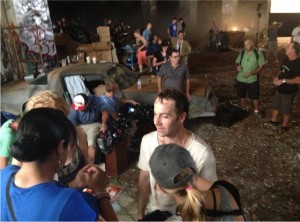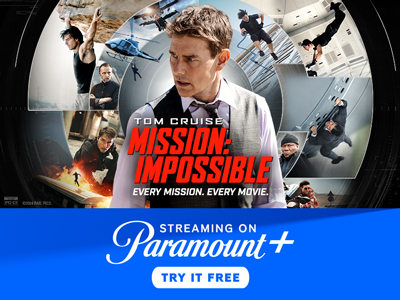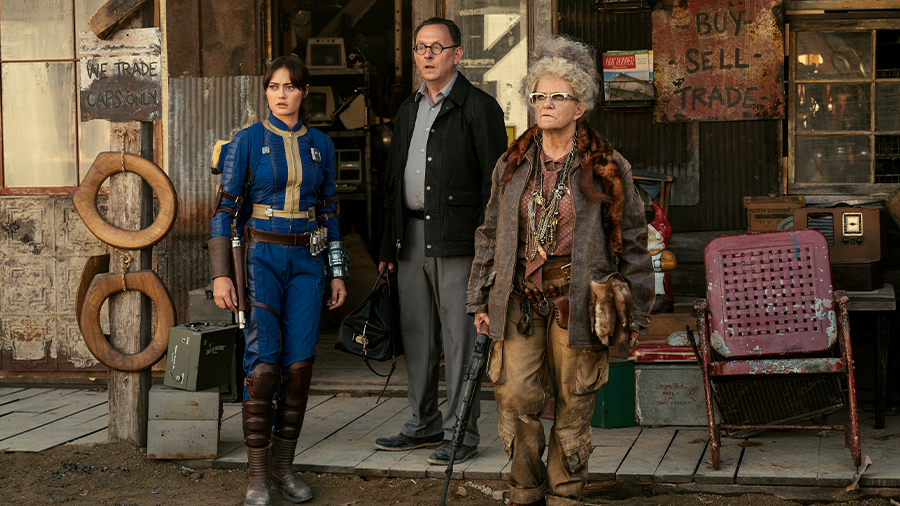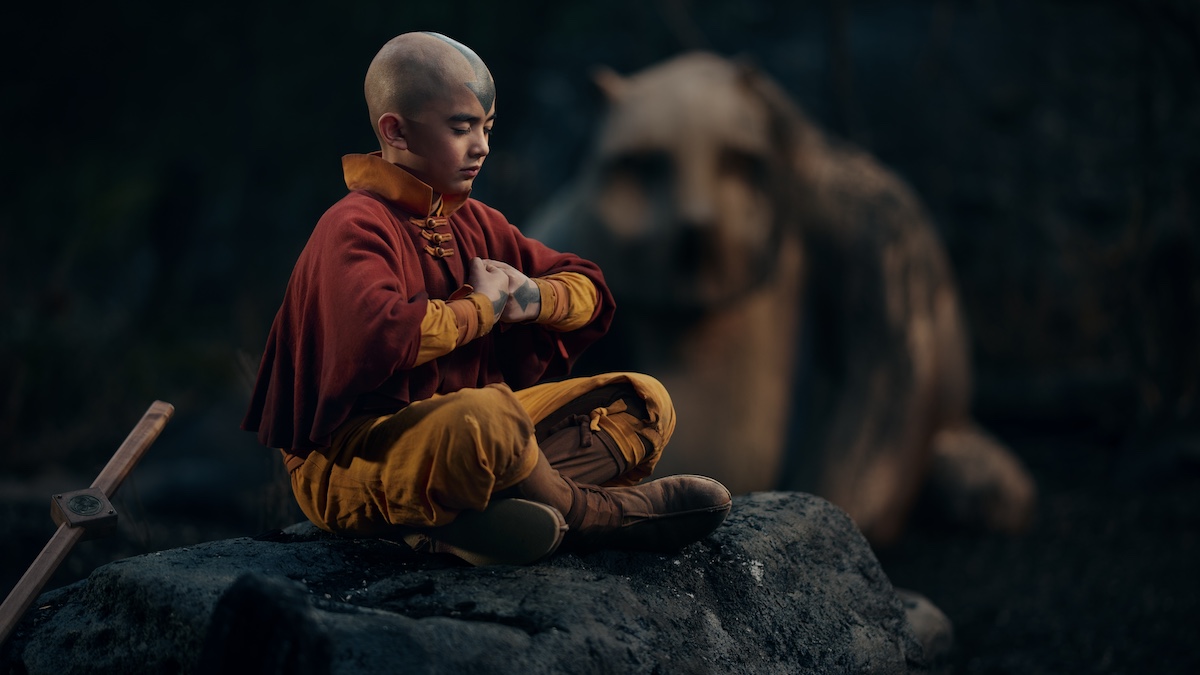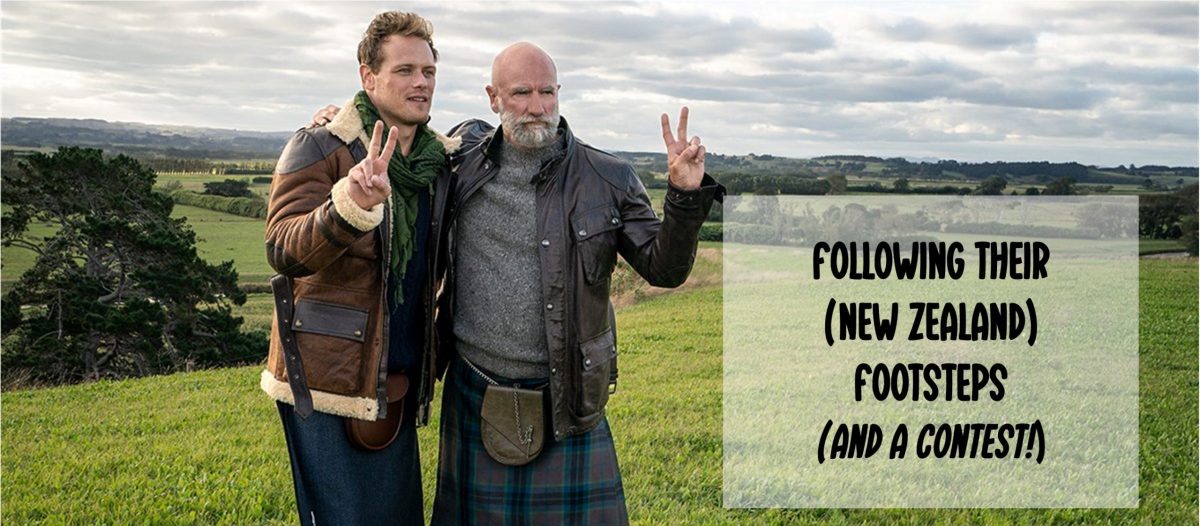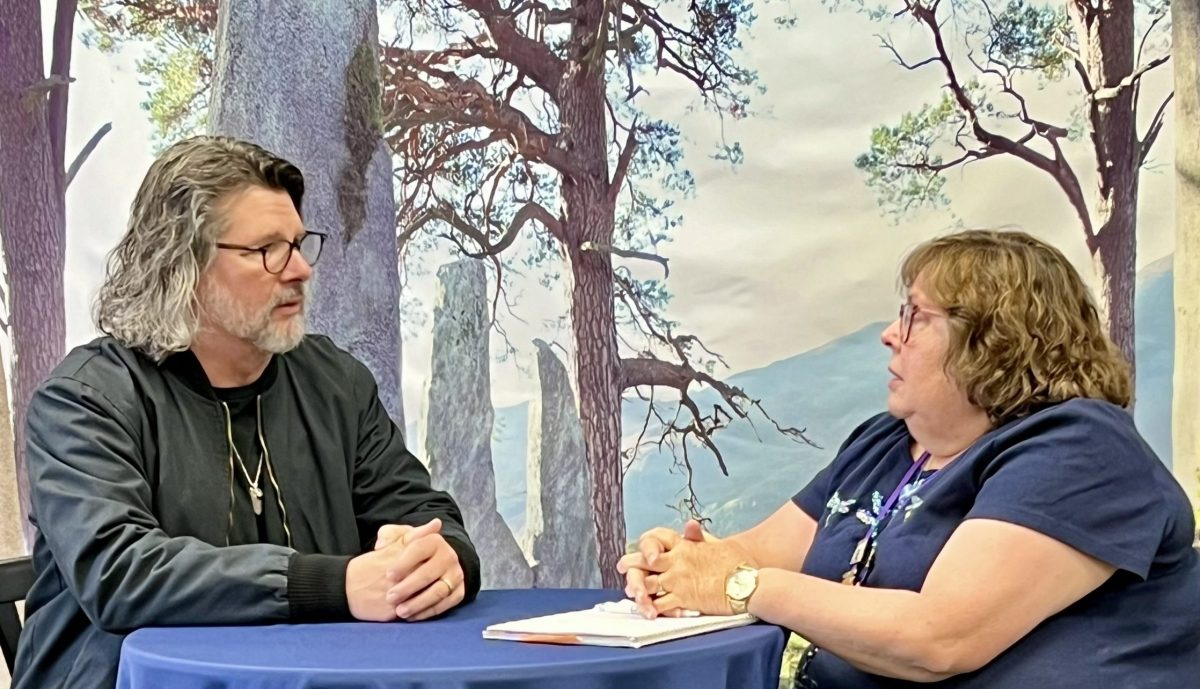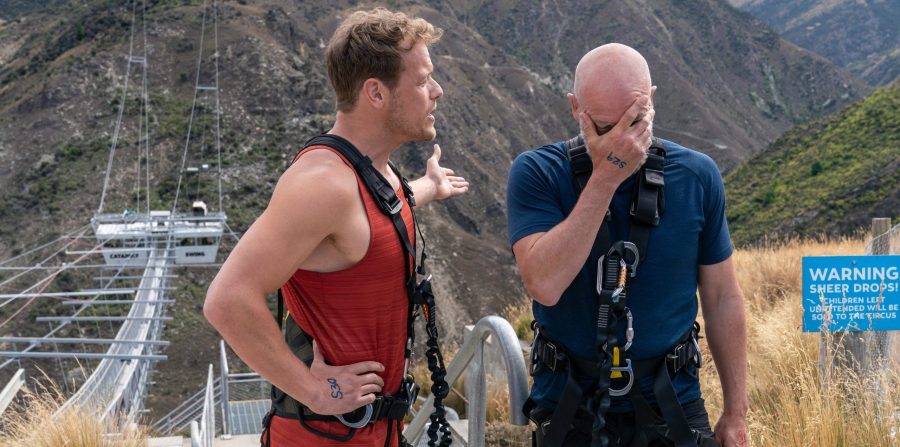Constantine’s creators and executive producers Daniel Cerone and David S. Goyer talked with reporters the other day about their relationship with NBC, and their interest in anti-heroes. Here’s the final part of that discussion. Be sure to see Parts 1 and 2!
Q I was struck by this, especially in the first episode, but as it had gone on as well, how scary Constantine is as a drama. And I was wondering if there’s anything NBC had asked you to tone down or change in what you showed so far.
David: Not really.
Daniel: Yes. I got the same. It’s funny, because they pushed us, not so much anymore now that we kind of understand – and, you know, I was a show runner the first two seasons of “Dexter.” David has done a ton of feature films where pretty much anything goes. But we’ve also done network shows over years and we’ve self-censored in the beginning. At every step of the way from the network, be it in the outline phase of the scripts or the cuts that the network were seeing, they’re like “Go further,” like “Push it further.” I’m not sure what changed the network landscape.
David: I don’t know if I could think of any instance in which they said “Tone it down.”
Daniel: Yes, there wasn’t one. They have pushed us to go bigger. They have pushed us to go darker. They pushed us to go scarier. There’s constantly – if I had to boil their notes down to one, it would be “Just make this as big and scary as possible,” like, that’s what they want to see. So it’s been really framed for us. We have to do what we do with them within budgetary limitations and capabilities. But no, they have not censored us at all.
Q So for Constantine kind of along the lines of what you’ve been discussing a little bit, he’s not like Arrow, he’s not like The Flash, he’s kind of a different kind of hero/antihero. So how does that factor into your writing and the portrayal of this character in order to still make people want to root for him? How do you make your antihero the hero?
David: First of all, I would say, there are heroes and there are antiheroes. And they’re both a lot of fun to write. But in some ways, writing antiheroes, antiheroes are more fun to write for because they’re not bound by the same moral code that the heroes are. And in some ways, antiheroes are more human because most of us have variables. Most of us are imperfect. And, you know, he’s doing what he’s doing for fundamentally noble reasons but he doesn’t really have a code of conduct.
I do think that audiences also like antiheroes. I mean, if you look at House, if you look at Luthor, if you look at Sherlock, I would categorize these characters more properly antiheroes than heroes. They can be fun. And different and it’s – they’re not operational. People want to be them and people want to be Superman. I don’t think people want to be Constantine because he’s kind of a miserable sod. But he’s also fun. And it’s fun to – you know, it’s a reverence and it’s just a different way to go.
Daniel: A lot of characters that are out there are doing what they do because it’s their job or because I have a badge or because I have a calling. As David said, you know, Constantine is doing the right thing but he’s doing it for totally humanist reasons, you know? It’s one of those fascinating aspects of the character to me is if you ask him why he’s out there, you know, helping humanity, I’m not even sure he can tell you.
Is he doing it because he wants to save lives? Is he doing it because, frankly, chasing demons is a bit of a fix for him and he’s just jonesing for the next kill? Is he doing it, as he said early in his career, for the women and to get laid? Is he doing it because it’s kind of self-empowerment? It’s just never really clear. And what’s great about him is I don’t even think he’s clear. But yet, he keeps doing it and he keeps fighting this fight. And yes, as David said, one of the funniest things is that there’s no code of conduct that he operates by. He’s doing the good things that all the cops and lawyers and whatever kind of other heroes are out there doing. But there’s no checks and balances for him. And that’s where he often gets into trouble.
When you ask what makes him relatable, I think that’s it because he has a self-sense to himself and he frequently goes over the line and he frequently makes bad calls and, you know, the fact that Constantine, if you – anyone who gets close to Constantine dies. I mean, that has proven itself true, you know, for years in the comic books. And, look, in our – very early in our series, you’re going to see that, too, where he makes the hard calls and he loses friends over it, sometimes literally. And so that’s kind of his curse and it makes him, hopefully – hopefully, that’s what makes him – it’s easy to vote for him.
David: I would also add that I think that these things are cyclical and I think that they come in waves and maybe it’s a broader commentary on where we are in society right now. But the television landscape right now is flourishing with the really flawed characters. And for whatever reason, audiences are responding and fascinated by these flawed characters. If you look at the television landscape now, you know, it used to be that there were a lot of – the black hats were the black hats and white hats were the white hats and it was very clear who is who but there are a lot of shades of grey right now and that seems to be kind of, you know, what’s happening with the right guys, you know, in terms of the role.
Q I was interested in finding out how much of the Pre-52 influenced the series as well as the Post-52 and how difficult is it to ride that line of horror and suspense without crossing over to get the censors on your case?
David: I would say as the sort of the resident comic book nerd, I would say that the show is almost exclusively influenced by the Pre-52, you know – the Hellblazer comics, you know? If for no other reason then Hellblazer ran for 300 issues and the new Constantine is – I know it’s less than 20. I’m not quite sure where they’re at now, 15, 16. They’re just not the body of work that exists in terms of what we’re influenced by. So without question, and I know this is really inside baseball, but the show is primarily influenced by and inspired by the Pre-52…
Daniel: Yes. If I can jump in on that part, David is completely right. We have the whole sort of Constantine canon at our disposal in terms of storytelling. We do look to the newer issues to see if there’s interesting story ideas for us or stories that we can use or adopt. But the Web described what we’re doing on the show as Constantine is this amazing mythology. And there’s this amazing character and it’s just like this fantastic car that we’ve been given the keys to, to take it for a spin and we’re doing that on network television. And the writers of the new 52 Constantine, they’re doing the same thing as we are. They’re basically rebooting the franchise. We’re rebooting for television. They’re doing it for sort of a new generation of comic book readers. So we’re kind of charged with the same task, in terms of taking what was there, the foundation of what was there and, just try to honor it and do the best that we can with it for our medium.
So yes, it’s all cool. I mean, one of the most fascinating things about Constantine to me is that it was the longest-running comic book series. According to my understanding of any imprint of any comic book publisher that was ever in its 30-year run, it was never rebooted, it was never renumbered, it was never reissued, you know. It just stayed in continuous publication as a guy who can – who aged on the page, you know, in real-time. And I just think that makes him such a unique character.
And what we’re doing on our show is we’re going back to the beginning. We’re basically meeting roughly the same time that you met him in Hellblazer in the very first issue. So our timeline when people are like “Wow,” you know, in terms of the cancer story and all the great arcs that he has, we just hope and pray that this show has legs because we’ll get to him like we love those arcs, dangerous habits and all the arcs that everybody else is excited about, we’re excited about. And what’s great is that we’re choosing an entry point where the character is young and all those adventures are ahead of him and we hope to dramatize as many of them as we possibly can.
What is the second half of that question, David? I don’t remember.
David: Oh, network censorship or not – how was it – it’s not network censorship, per se, but it’s – I think has it been a challenge to sort of ride the line between, I guess, broadcast standards and coming up with something that’s scary and suspenseful. Right?
Daniel: If you read the network’s standards that we get, it’s like “Can we please not hear him urinating? It’s okay to urinate on screen but as long as we don’t hear it.” Or there’s a shot where Zed is like painting this young guy and he’s nude – like a nude model and it’s like “He can be nude but can we see him from the sides so we don’t see his butt crack because it’s like – it’s okay he’s nude but we just – we can’t see the crack.” So those are the censorships…
David: It’s not too bad. Yes.
Daniel: No, it’s not at all.
Q Since there are other shows where someone hunting demons like Grimm and Supernatural, do you do things – is there anything that you do to make sure that you’re not inadvertently copying them or do you have someone watching for that kind of thing or just do your own thing and hope for the best?
David: Well, first of all, let me just say that, taking nothing away from those shows, I think what’s fundamentally different about our show versus like “Oh, well, just show people Supernatural” is the John Constantine character. He’s an amazing character. And with all due respect to those shows, he was around a lot longer – a lot earlier than they were. And I know some people have said “Oh, this is the character on Supernatural” that Constantine is like, that character was influenced by Constantine, not the other way around. And he’s been around for 25, 30 years. So I think once people see a few more episodes under their belt, particularly the episode that’s going to air Friday night, I don’t think – it’s a very, very, very different show than those shows. And I also think there’s room for all of that.
Daniel: I will say this, though, as a storyteller, you can’t pay attention to what other people are doing on similar shows. I think that’s where you get into trouble, frankly, because if it’s in your head, “Oh, they did this creature” or “They did this scare” or “They did this sort of legend or mythology.”
You know, then you start comparing yourself and, look, we’re just trying to channel the character John Constantine as clearly as we can. I mean, funny, one of the first shows that I came in on as a young writer was Charmed and I spent, like, the first four years of my career on Charmed. You know, we’re doing this on Charmed before they’re doing on Supernatural. Supernatural, you know, X-Files is doing it before us. Buffy was in the middle of it all. You know, all you can do is trust your characters. That’s, hopefully, what people are tuned in to every week and, within that framework, we try and tailor, we might do a vampire story or a zombie story. In fact, look, we’re doing – there’s elements of a zombie coming up for us but look at filtered to the world of Papa Midnite. So it’s voodoo zombie. It’s more old school, raise and assault and bringing recently-deceased humans back. It’s not the sort of zombie – apocalyptic zombie virus that we’re all accustomed to. So, we’re always going to spin it through our filter and – but you can’t worry about what other people are doing and really tell good stories.
Thanks so much to David and Daniel! Do you have any more questions for them? If we get this kind of opportunity again this season, I’ll try to ask them.
Follow me on Twitter: @ErinConrad2 and @threeifbyspace.net
Subscribe to threeifbyspace or “Like” us on Facebook for instant notice of new posts

